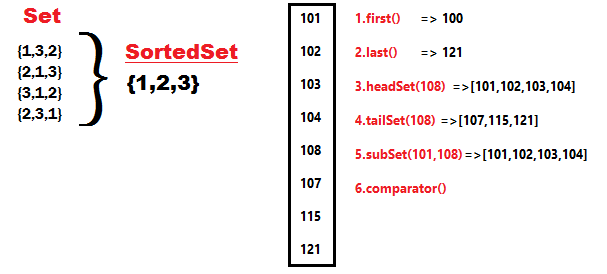TreeSet – Internal implementation
Set
|
SortedSet
|
TreeSet
java.util.SortedSet (Interface)
-
Is the child interface of Set
-
If we want to represent a group of individual objects according to some sorting order without duplicates then we should go for SortedSet
SortedSet Interface defines following 6 methods.

-
Object first( )
-
Object last( )
-
SortedSet headSet(Object obj)
-
SortedSet tailSet(Object obj)
-
SortedSet subSet(Object start, Object end)
-
Comparator comparator()
Used to get Default Natural sorting order- Numbers Ascending order [1, 2, 3, 4, 5….]
- Strings Alphabetical Order [A, B, C, D, E…a,b,c,d …] (Unicode values)
TreeSet Implementation
-
Underlying D.S is Red-Black Tree
-
Duplicate objects are Not Allowed
-
Insertion order Not Preserved but we can sort elements
-
Heterogeneous Objects are Not Allowed, if try it throws ClassCastException at Runtime
-
Null Insertion allowed (Only once)
-
TreeSet implements Serializable & Clonable but not RandomAccess
-
All objects are inserted based on some sorting order either default or customized sorting order
Constructors
-
TreeSet h = new TreeSet ()//Default. SortingOrder Creates an Empty TreeSet Object, all the elements inserted according to Default Natural SortingOrder -
TreeSet h = new TreeSet (Comparator c)//Customized. SortingOrder Creates an Empty TreeSet Object, all the elements inserted according to Customized SortingOrder -
TreeSet h = new TreeSet (Collection c) -
TreeSet h = new TreeSet (SortedSet s)
TreeSet h = new TreeSet (SortedSet s)
public class TreeSetDemo {
public static void main(String[] args) {
TreeSet t = new TreeSet();
t.add("A");
t.add("N");
t.add("Z");
t.add("h");
t.add("X");
t.add("i");
//t.add(10);
//Exception in thread "main" java.lang.ClassCastException:
//java.lang.String cannot be cast to java.lang.Integer
//t.add(null); // java.lang.NullPointerException
System.out.println(t);
}
}
-----------------
[A, N, X, Z, h, i]
IMPLEMENTATION
- TreeSet is like HashSet which contains the unique elements only but in a sorted manner.
- TreeSet uses TreeMap internally to store its elements.
public class TreeSet<E> extends AbstractSetimplements NavigableSet,Cloneable, Serializable
{
private static final Object PRESENT = new Object();
public TreeSet() {
this(new TreeMap<E, Object>());
}
public boolean add(E e) {
return map.put(e, PRESENT) == null;
}
}